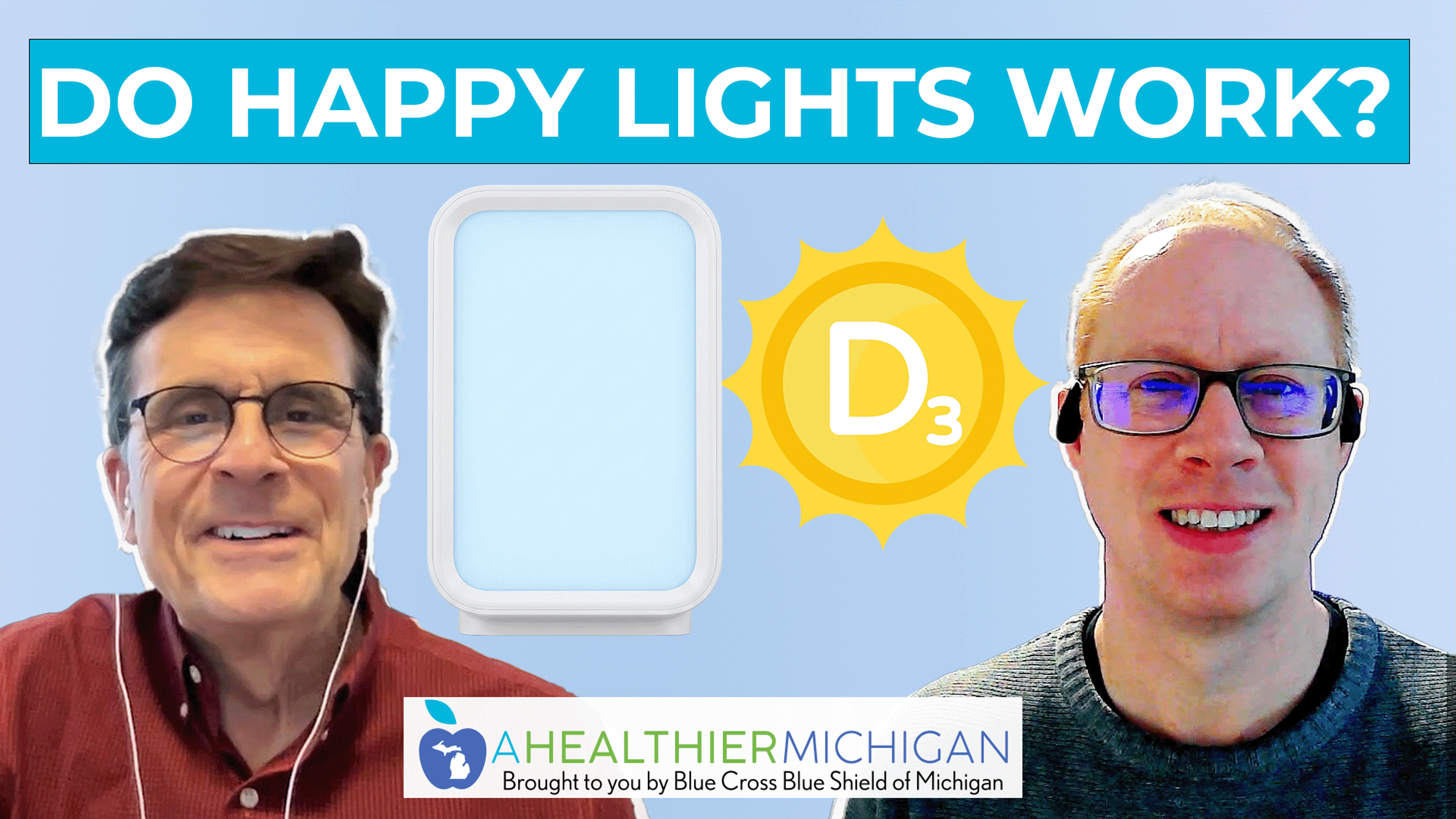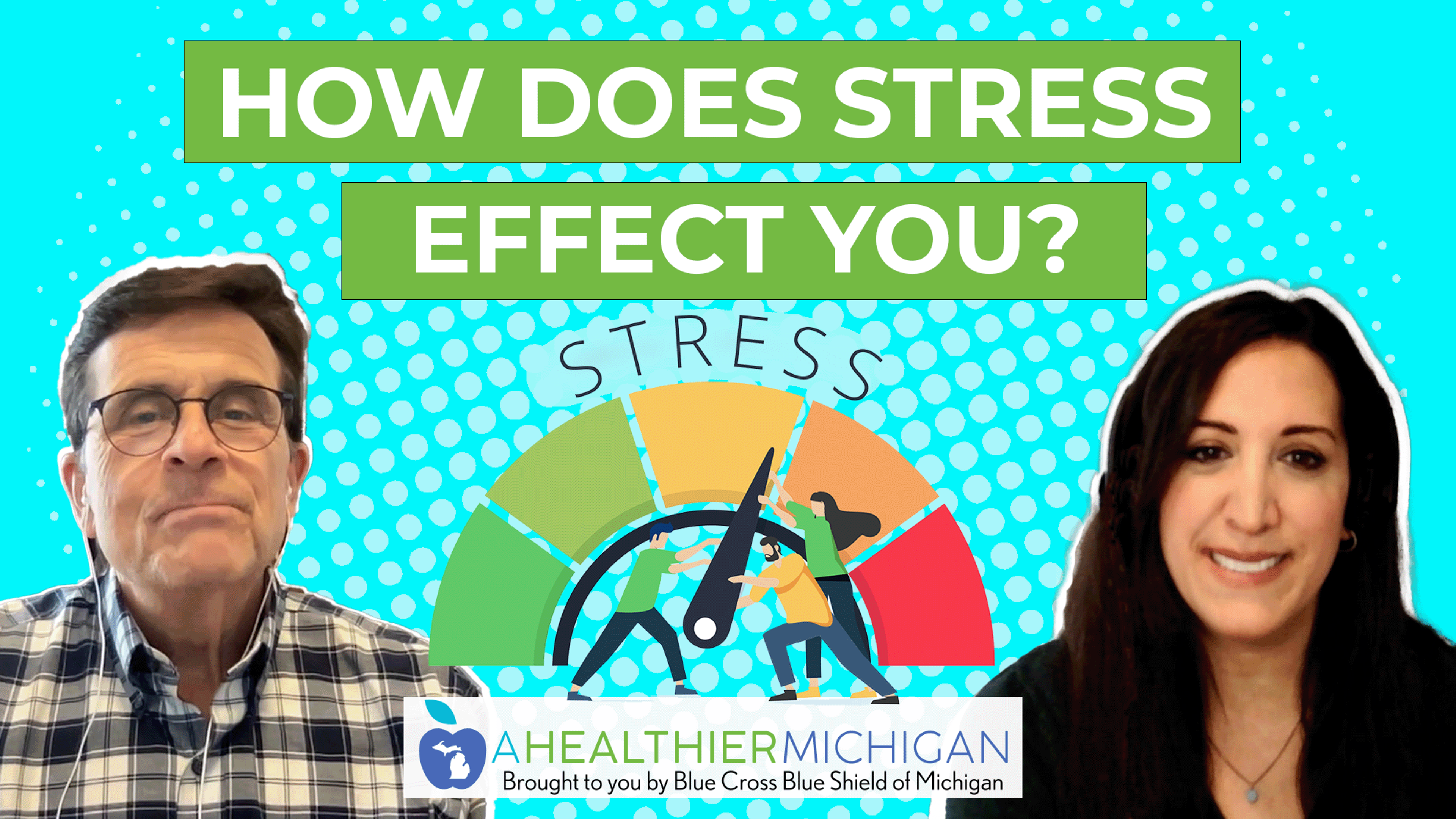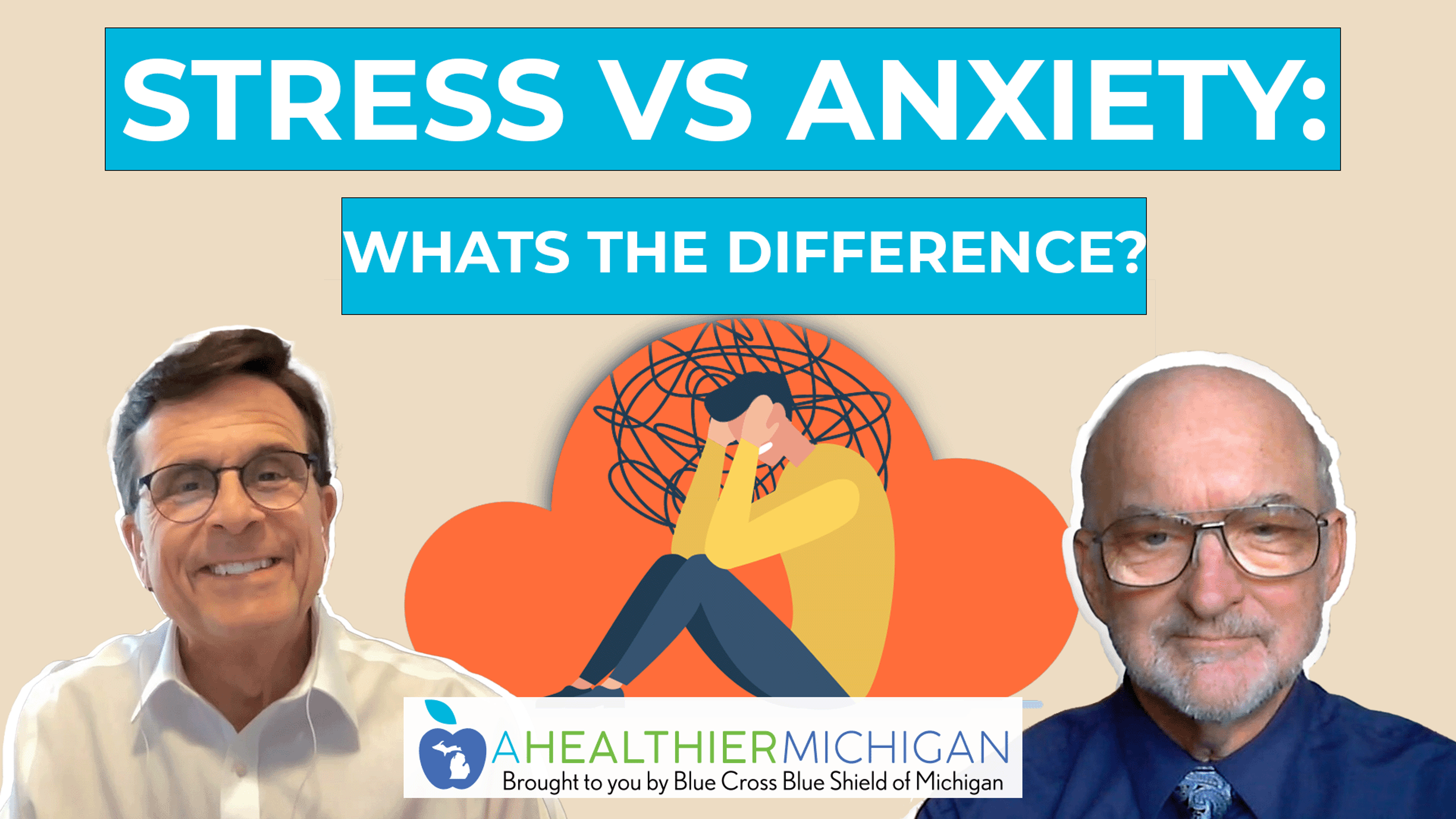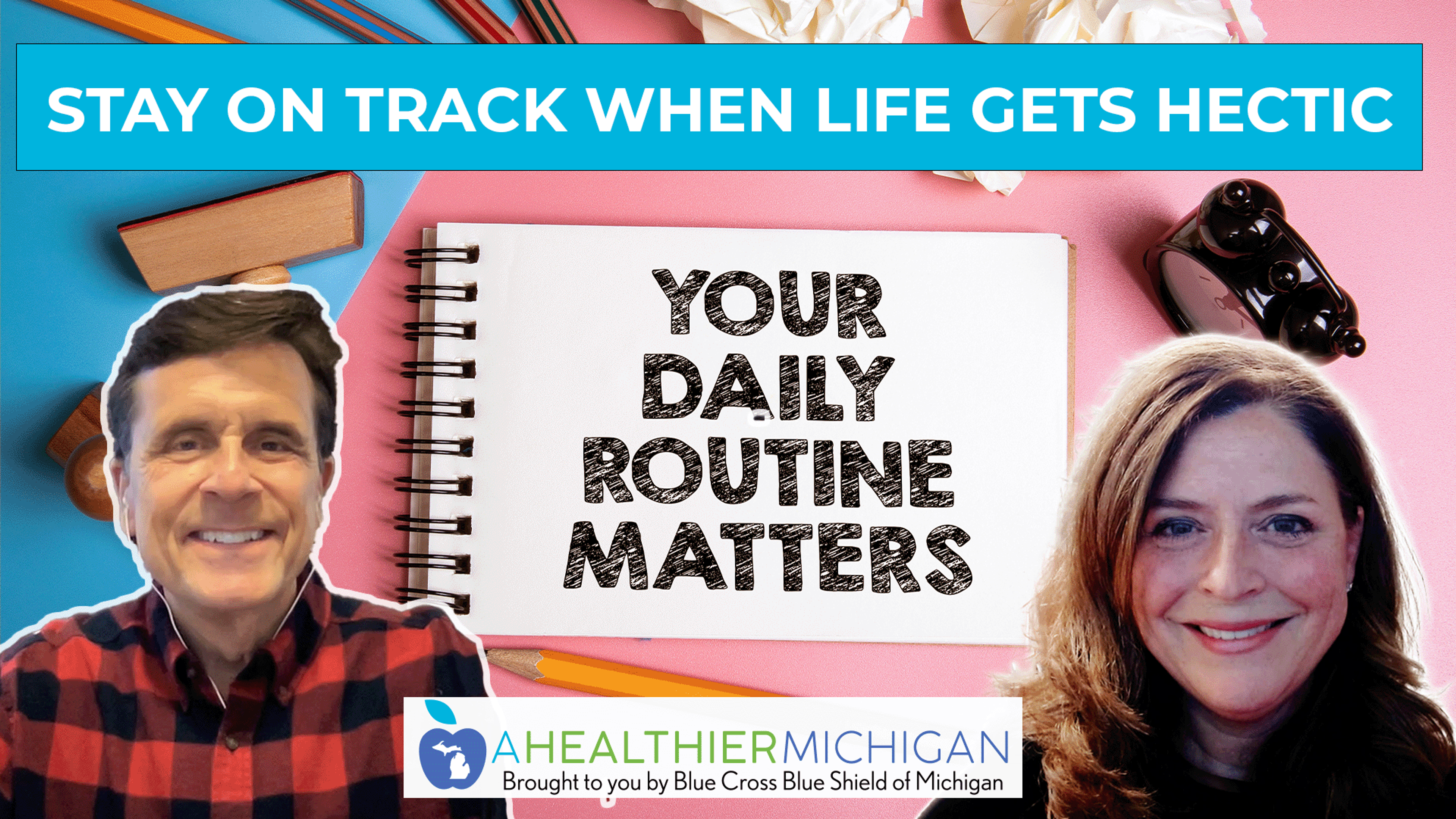Why Diets Don’t Work
| 1 min read
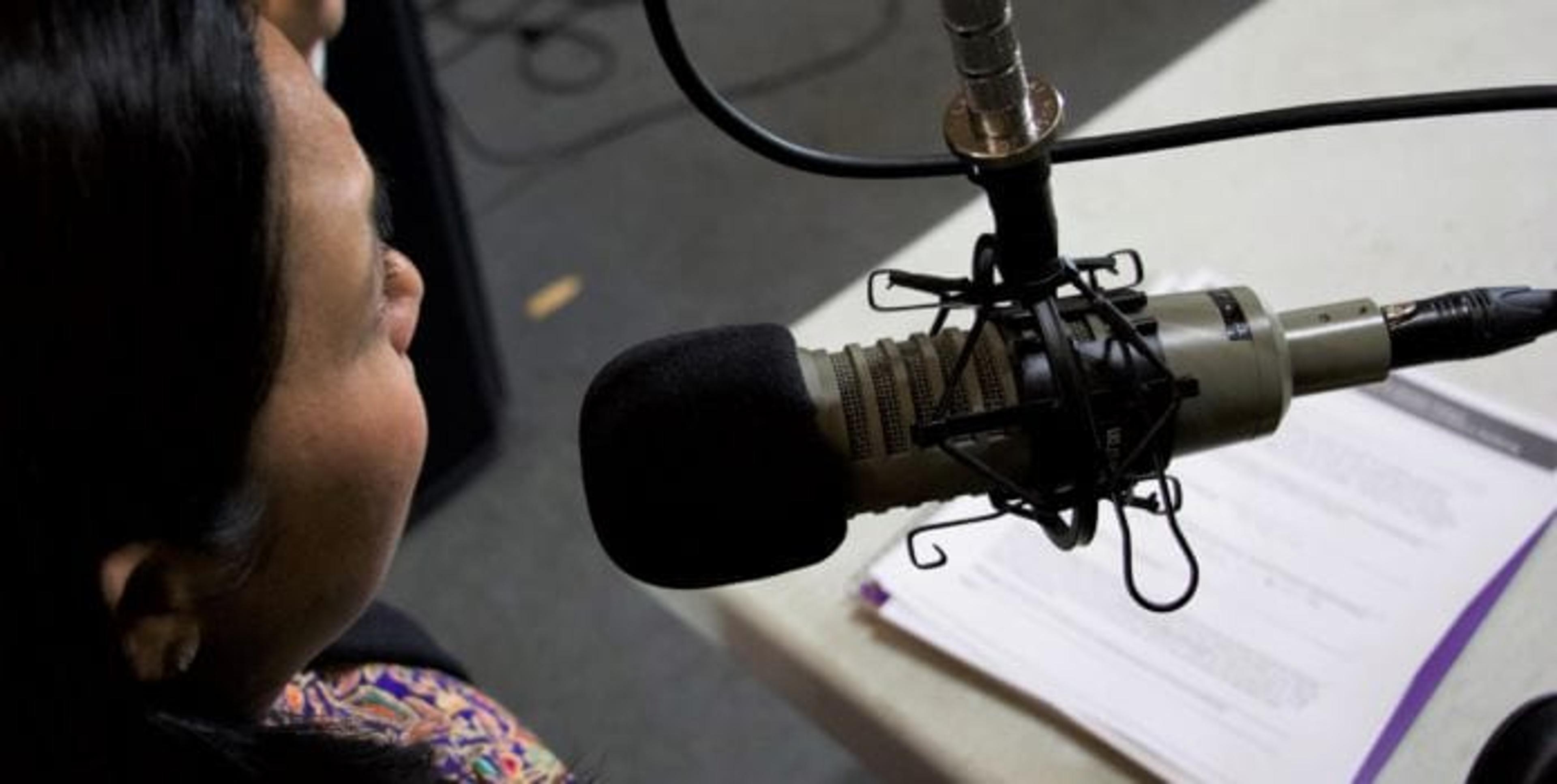
00:00
00:00
About the Show
On this episode, Grace Derocha is back in the studio with Chuck Gaidica to discuss the different reasons why diets don’t work in the long run, and how we can approach eating sensibly to get the most out of our health goals.
“I want to remind people that you don’t have to make every change in the world today. Allow yourself to grow into the healthy habit and piggyback off of that.” – Grace Derocha
In this episode of A Healthier Michigan Podcast, we explore:
- The idea that diets have a connotation of a beginning and end, but what happens after the diet is done?
- The reality that drastic changes to our diets often don’t align with our lives.
- The fact that 95 percent of diets fail people.
- How to assess our current diet, including what might be missing and adding healthier fare in instead of cutting entire food groups out.
- How our social circles influence us as much as we influence our social circles.
- Why different accountability checks are helpful for maintaining a healthy diet (app notifications, support networks).
- The idea that no two people are the same when it comes to his or her diet. What works for one person may not work for others.
Transcript
Here is the full transcript of this episode. You can listen to the audio version on streaming platforms or watch on YouTube.
Chuck: This is A Healthier Michigan Podcast, and we are at episode three. Coming up we discuss why diets don’t work.
Chuck: Welcome to A Healthier Michigan Podcast. We’re glad you’re back. If you’ve missed episode one and two, you’ve missed good stuff, so you can go back and listen to those. This is a podcast that is dedicated to navigating how we can all improve our health, our well being. We can start with small habits. We can get great habits that just turn into ritual, and we can start implementing all of that stuff, great stuff, today. I’m Chuck Gaidica. I’m your host. Each week we sit down with a certified health expert from Blue Cross Blue Shield of Michigan, and we will take on topics like nutrition and well being, stress reduction, sometimes all at the same time. Today we’re going to be talking about why diets don’t work, but our expert who’s here with us again, Grace Derocha.
Chuck: Grace is a registered dietitian, certified health coach, at Blue Cross Blue Shield of Michigan, and she’s a featured blogger right here at A Healthier Michigan. She’s a lover of food, lover of life. Loves her family. Mommy of two, and she’s very passionate as a teacher for all of us here. Graduated from MSU with a bachelor of science in dietetics and a bachelor of science degree in psychology. She’s also got an MBA from Wayne State University. Just a joy to see. Good to see you again.
Grace: Thank you so much. That’s one heck of an intro.
Chuck: You’ve got lots of great credentials, but you know you are a great teacher because you do it in such a sane way. For all of us who – we hear so much stuff coming at us. It’s just the noise of life about diets and what to eat, and so that’s a really good question here about diets. Why don’t they work?
Grace: I think there’s so many different reasons why a diet doesn’t work, and I know we kind of touched on this in episode one. The word diet itself now has this connotation of having a beginning and an end. There’s diets like Whole 30. You only do it for 30 days, and then what? That’s what I want to ask. Then what happens? You do whatever, or you’ve deprived yourself so much with a particular kind of diet that once you’re off the diet then those foods become evil? How does that make someone feel?
Chuck: Don’t we crave chocolate cake with icing, even if it is evil? Then when you go for it, you eat half the cake instead of that little slice to satisfy your pallet.
Grace: Yeah. Let me ask you, what’s your favorite food in the whole world?
Chuck: Favorite food in the whole world? A steak probably ranks up there, although I don’t eat it much, but if I had to be honest just a piece of chicken that could be lightly breaded and put in a pan. I mean, I love chicken. I don’t know why. I just love it.
Grace: What if I said to you, “You can never have chicken again”?
Chuck: That’d be bad news.
Grace: Right. One, you wouldn’t listen to me. Two, you wouldn’t like me. Three, it doesn’t make sense for your life. Right?
Chuck: Yeah.
Grace: If I said, “Now you have to be a vegan,” that’s not going to work because you love chicken. That’s what I see happen often with a lot of these different diets. One, there was an author that wrote a book to tell you to cut out something. Think about it this way. We just talked about food groups and macronutrients and micronutrients. If you have that wide spectrum of food that is offered to us, that could fuel our body the right way and help us live healthy, if I said, “You have to cut out three of those food groups,” of course you’re going to lose weight if that’s someone’s goal because you’re cutting out all those calories from those food groups. Then what happens? There’s research that shows that 95 percent of diets fail.
Chuck: Ninety-five percent? This whole idea, this kind of running gag, that I’m just going to start my diet on Monday, well that’s why that actually is happening because 95 percent of last week’s diets failed.
Grace: Exactly. Then the five percent of people that have some success when it comes to weight loss and diets, in five years they have regained weight back, all of it, and then some usually. A third to two thirds of the people gain more than where they were at when they started their so-called diet.
Chuck: Is there something outside of the balance … You’ve said this in really the first two episodes, and now already in this one, the idea that if we’re balancing through the day, the macronutrients right, the protein and the carbs and the fat, and then we’re also into micronutrients, so we’re getting things that give us this rainbow of color, you’ve really educated me in juts the past couple episodes. I’m thinking, “Okay, I’m doing a pretty good job of eating berries and different kinds of veggies.” If I’m balancing, is that a good enough diet, or what can we do that we actually know does work?
Grace: You mentioned your app. I think it’s really important to be able to take a step back, assess at where we’re at, how we’re doing, what might be missing. Instead of saying, “I have to cut out everything. This is evil. This is bad. You can’t have it anymore,” why don’t we look at what we need to add in? Why don’t we take note of how we’re doing today and say, “You know what? According to this, and I talked to my doctor, I don’t get enough choline for brain health. Maybe I should be having the egg yolks,” because egg yolks have choline. Whatever it might be.
Chuck: Are eggs truly the perfect food? I hear that phrase being said as long as you’re not going crazy with them.
Grace: I’m a fan of eggs.
Chuck: You are?
Grace: I want people to eat the whole egg most of the time. Unless they’re – case by case with people that have scenarios where they shouldn’t or should maybe have a whole egg and an egg white instead of two whole eggs. Whatever the case may be. I’m a fan of the whole egg.
Chuck: That’s good to know, because that’s sane advice.
Grace: Obviously that’s for the general public. Again, if someone has really, really high cholesterol and needs to be very strict, then we would have to look at that.
Chuck: When you say, “Look at the different food groups and add things in that you’re missing from your diet,” some of the stuff you’re asking us to add in doesn’t really impact the bottom line much. The other day I’m making a salad. I’m throwing in spinach. We’ve got fresh strawberries. It’s a great season. I cut up strawberries, and I don’t know exactly, but I go to my little app and I’m thinking, “That’s about a quarter cup of sliced strawberries.” It says something like crazy, like 37 calories. I’m like, “What?” I mean, between that and the spinach and the stuff I added, it was almost non-existent in terms of impact on my diet, but all the good stuff I was getting was incredible.
Grace: Yes. I’m so glad that you brought that up, because I think it’s important to realize that sometimes what we’re adding in is going to give us more benefit than what we might be trying to take out.
Chuck: Don’t necessarily cut back on having that chicken on the salad, but just add all the other good stuff?
Grace: Maybe you need the protein. People that are working out and trying to build lean muscle might be needing some of these things. We know. I feel like – poor carbs – carbs get such a bad rep. I think if people realize carbs help balance hormones, carbs help our central nervous system in our brain-
Chuck: Don’t they give you energy too?
Grace: Yep.
Chuck: Like when you’re feeling through the day like, “Wha wha wha,” carbs can help boost you?
Grace: Yeah. Carbs are our main source of fast acting energy.
Chuck: Did you like my sound effect?
Grace: I did. That was a good one.
Chuck: It’s a big time show.
Grace: I felt that. That’s my stop the slump around 3 p.m.
Chuck: Is it really?
Grace: Yeah. That noise.
Chuck: What do you grab then? What do you do to stop a slump?
Grace: You’re going to like this. I’m going to give you guys my trick, and I know you had this for breakfast the other day. I will cut an apple. Then you know those fancy cutters where you can cut and the core-
Chuck: Yeah, takes the core out.
Grace: Yep. Then I take the core out. Are you ready for this? Then I put peanut butter in there. Then you put a rubber band around the apple. Then you have apple and peanut butter all in one thing. You didn’t have to use a container or seven containers.
Chuck: You just take it on the go?
Grace: Yeah. You have just that rubber band holds it together.
Chuck: Interesting. That’s your peanut butter hold.
Grace: That’s one of my favorites. I love to make my own little energy bites, so I’ll put different kinds of nuts or different kinds of dried fruit in that. Trail mix.
Chuck: I’ve admitted this already in various ways the first couple of episodes. I’ve been on a lot of different diets my whole life. When I was a kid, I was a young teen, and I remember there were moms in the neighborhood, not my mom but my buddy’s mom went to this thing. It was called TOPS. Take Off Pounds Sensibly. It’s one of the groups that you go to, right? Maybe they still exist. I don’t know. You would go, and you would stand on the scale. You’d lose two and a half pounds. Everybody would applaud. Then, at the end of the meeting, all the moms, it was mainly moms and a couple of us teen boys, would all go out for lasagna.
Chuck: I thought, “Oh my gosh. This diet is never going to work,” but there’s always a way around a diet. What is it that we can do where we see diets working, but I guess the ultimate question is why don’t they work? It’s not just us. Is it just our psychology, or is it all this information we’re being pounded with?
Grace: No. I feel like you’re reading my mind. One of the things I wrote down was the social and community aspect of different things regarding diet. Part of that is, “Hey, Sally, have you heard about that new ketogenic diet? I heard that so and so’s doing it, and it’s supposed to just burn fat right off, but you can’t have any carbohydrates on it. Let’s do it together.”
Chuck: Right, right. Social connection becomes social contagion, right?
Grace: Yes.
Chuck: You’re influencing people around you. You would hope that when we become influencers, it’s for good reason. Sometimes like this maybe you’re taking somebody down a path you didn’t even know won’t work.
Grace: I had a girl friend for at Christmas time she would always buy whatever the latest diet book was for everyone in our circle of friends except for me because she knew that I wasn’t going to accept what that was. It was fool proof. Every time, Chuck, they would all start this thing because it was Christmas. Then going into the new year they’d start this. Then by February I’m getting text messages from all of them like, “This isn’t working. I hate this. This one tells me I can’t even have quinoa. This can’t be right.” I’m like, “You knew from the get-go that it wasn’t going to be right. This has happened three times. You knew this was going to happen, and now you’re miserable.”
Chuck: Social contagion this idea that you’re influencing others, can also have a positive spin, and I’ve seen this, because my wife Susan is … I’ve always kidded her, “You could walk out and get a Cinnabon,” and she could put butter on it, and she will eat it. The next morning because she weighs every day … I hate my scale, but anyway she will get on it every day, and she will say, “Oh. I lost a pound.” I will be, “Oh my gosh. I don’t even understand your makeup, your DNA, your genes, of how this works.” Now she sees me with this app. She said it again to me just two days ago. She said, “When I first saw you inputting stuff at a restaurant, I thought, ‘This is really disturbing to me that we have to go to a store and you’re scanning things.'” Then she says to me about three months ago, “You know, I want to download that app. It’s free, and I’m going to start using it.”
Chuck: She only wanted to take off like four or five pounds. Sure enough very slowly, because it’s just sane, it comes off. She said, “Now I’m paying attention to everything, which is going to benefit the kids and our grandkids when they come over.” I have seen the positive influence of going from just being socially connected to now I influence her.
Grace: Yeah. There is definitely a flip side to that. I think having an accountability partner for exercising and talking about new recipes with your friends can definitely help inspire. We know. There is research behind that that healthier people hang out with healthier people because we influence each other in that respect.
Chuck: That’s even good if you want to go for walks after dinner. Find a couple neighbors, and go.
Grace: Absolutely. People that want to quit smoking together. We see that often too. In a household, if the couple continues to smoke together, they’re going to continue to smoke together. If they decide that they’re going to quit, they have each other to piggyback off of the trials and tribulations of what it might look like. What works for them, what doesn’t.
Chuck: In a way you could become a coach for your spouse or your friend, right? Or vice versa?
Grace: Absolutely. You don’t have to be a dietician or on a podcast to be able to help someone that you love. In the meantime, when one teaches, two learn or many learn they say. You’re also helping yourself.
Chuck: What other things work? Let’s concentrate on the positive. What are some things we could instill today that we could actually get working for us?
Grace: I want to remind people that you don’t have to make every change in the world today. Allow yourself to grow into the healthy habit and piggyback off of that. Maybe you know it’s something as simple as I know I don’t drink enough water. What can I do that can help myself do that? Maybe it’s you mark your water bottle with times so that by this time you have to drink this much.
Chuck: I should do that.
Grace: Yeah.
Chuck: That’s interesting. Wait. Say that again.
Grace: Your dad could do that as well.
Chuck: I put little hash marks.
Grace: Yeah. With different times on the water bottle. By 9:00 a.m., you have to be done this far. By 11:00 a.m., you have to be down this far. By-
Chuck: You know they have a bottle of … Have you seen the on that flashes?
Grace: No.
Chuck: Oh yeah. There’s one of those BPA free bottles. It looks like the thing you wash. You just fill it up with good water. It’s got a little LED light in the top, and you can program it. It starts to flash in the lid, and I saw this happening. I thought, “Why is your water bottle flashing?” “Oh, I have to go drink water now.” It tells you when to drink water. I thought, “That’s brilliant.”
Grace: That’s amazing. Again, there’s a different accountability checks with different things that can help remind you of that. Maybe it’s the app. Maybe it’s talking with your girlfriends about what can we do to help each other get our fruits and vegetables in? What can we do to make sure that we’re having some self-love, self-care time for ourselves? Maybe it’s reading a body positive book together and then having book club about it. Then doing things in that nature that can help spur good, healthy changes that can last for the long haul.
Chuck: When I see your blog posts, and I know there are others, but you’ve got some great, rich content there. We could encourage people to check out a blog because, when I look at your blog, there are takeaways. There are things that we can do right away, because those kind of things can say, “I can do that.” I need encouragement sometimes that I know I can actually do it.
Grace: Yeah. That there’s ideas. I think this is important. A reminder that everyone’s body is not the same. Have you ever seen … I’m going to tell the people … There is this video. It’s called “Poodle Science.” It talks about how every dog isn’t a poodle. If a poodle is telling you, a bull mastiff, that you need to do x, y, and z according to their book to lose weight or to be your healthiest self … Because I don’t think … Does health … I’m going to ask out loud, but I have an answer. Does health equal weight loss?
Chuck: Not necessarily, right?
Grace: Not necessarily, right? Because maybe I’m a bull mastiff, and you’re a poodle.
Chuck: Right, but there are certain benchmarks. I mean, if you see somebody or if you are or if you have been … I weighed a lot more when I was a teenage kid. You know that there are certain things that if you age, that if you’re carrying a ton of weight, that can influence your joints and your tendons. There are some things that are.
Grace: Yeah. I would say obviously overweight and obesity is an issue and impact on health definitely.
Chuck: I know what you mean. Yeah, and everybody’s metabolism is different. This is so much based on context. If you don’t get to know yourself, which the breathing exercise you did last episode, some of those things that you get to know yourself, even in a brief few seconds, is helpful to establish what you’re going to do.
Grace: Right. The only reason why I bring up “Poodle Science” because then you can be in tune with who you are. Are you a poodle? Are you a chihuahua? Are you a bull mastiff? Maybe you’re a giraffe? Who knows? Allowing yourself to be your healthiest self hopefully accomplishing weight loss goals that can help keep you healthy. Then also focusing on different things like, “Maybe I need to cut out extra sodium because my blood pressure’s creeping up. Maybe I need to reduce some stress with doing some exercise and being more mindful. Maybe I need to put down the cell phone and stop looking on Instagram at supermodels because that’s not good for my psyche.”
Chuck: I have to do that too? I’m just kidding. The thing is you’re giving us some information that really leads me to be encouraged. We sometimes don’t want to focus on baby steps, and baby steps are okay. I had somebody say to me … This is not a joke. I was in the midst of losing some weight recently, and I had lost nine pounds. Relative to how much I want to lose, that was a pretty significant chunk of weight.
Grace: Yeah. That’s awesome.
Chuck: The person who says to me, “Oh, well that’s nothing,” they have a need to lose a lot more. I thought, well, first of all, that was discouraging, but secondly I thought, “No. For me, that was a great goal. I’m actually happy that this has happened.” It happened gradually, and it’s staying off. You have to be careful you don’t get Debbie downers around you too.
Grace: I know. We need to stay positive.
Chuck: Let’s coach each other.
Grace: I should say that too. Some of these diets may be a kick start for someone to get on the right track. They might not all be evil and overwhelming. It might be somewhere that someone needs to start at that point with that very structured look at food to get them started down their right path. It’s not always all bad all the time.
Chuck: Good advice. I think I would be a Siberian husky. I mean, I know I would shed a lot, but I just … Thanks Grace. Good to have you back for episode three. We’re glad you’re here too. Thanks for listening to A Healthier Michigan Podcast brought to you by Blue Cross Blue Shield of Michigan. If you like the show, you want to know more, check out Grace’s blog. Check out all the podcast episodes at ahealthiermichigan.org/podcast. Ahealthiermichigan.org/podcast. You can put a review there, a rating on iTunes or Stitcher. All the new episodes, you can get them on your smart phone, on your tablet. Be sure to subscribe to us on Apple Podcast and Stitcher, or you can use your favorite podcast app as well.
Chuck: Next week Grace is back, and then we’ve got some other great guests lined up as well for the future as we continue talking about all kinds of different parts of your health and wellness. Next week we will talk about the importance of gut health. These are major headline generating things. Talking about our gut, what’s going on inside. Yes, you can correct what isn’t working. We’ll see you next time.

